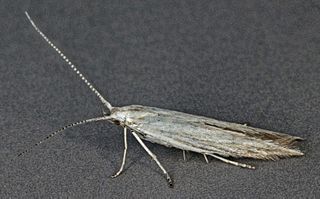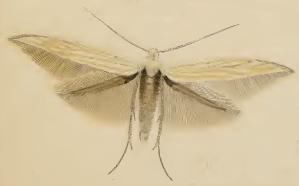
The Coleophoridae are a family of small moths, belonging to the huge superfamily Gelechioidea. Collectively known as case-bearers, casebearing moths or case moths, this family is represented on all continents, but the majority are found in temperate areas of the Northern Hemisphere. They are most common in the Palearctic, and rare in sub-Saharan Africa, South America, and Australia; consequently, they probably originated in northern Eurasia. They are relatively common in houses, they seek out moist areas to rest and procreate.

Coleophora is a very large genus of moths of the family Coleophoridae. It contains some 1,350 described species. The genus is represented on all continents, but the majority are found in the Nearctic and Palaearctic regions. Many authors have tried splitting the genus into numerous smaller ones, but most of these have not become widely accepted.

Coleophora striatipennella is a moth of the family Coleophoridae that is found in Europe and Near East. It has been introduced to New Zealand.

The trefoil thick-horned tinea or large clover case-bearer is a moth of the family Coleophoridae. It is found in Europe, North Africa, Asia Minor, Afghanistan and North America.

The metallic coleophora moth is a moth of the family Coleophoridae. It is native to Europe and Armenia, but is an adventive species in the Nearctic realm, where it is found throughout the United States and southern Canada. It has also been recorded from New Zealand, Chile and Argentina.
Coleophora oriolella is a moth of the family Coleophoridae. It is found in Germany and Poland to the Iberian Peninsula, Sardinia, Sicily and Greece and from France to southern Russia.
Coleophora dignella is a moth of the family Coleophoridae. It is found in Spain, France, Italy, Germany, the Czech Republic, Austria, Romania, North Macedonia, Greece and southern and northern Russia.

Coleophora clypeiferella is a moth of the family Coleophoridae. It is found from Fennoscandia to France, Austria, Hungary and Bulgaria and from Great Britain to Latvia, Lithuania and Ukraine. It is also known from the Caucasus and Ural regions of Russia and China. It occurs in steppe and cultivated areas.

Coleophora silenella is a moth of the family Coleophoridae. It is found in most of Europe, except Fennoscandia, Ireland, Greece, Portugal and Ukraine.
Coleophora fagicorticella is a moth of the family Coleophoridae. It is found in the United States, including Kentucky.
Coleophora quadrilineella is a moth of the family Coleophoridae. It is found in the United States, including Kentucky.
Coleophora sexdentatella is a moth of the family Coleophoridae. It is found in Canada, including Nova Scotia.
Coleophora biforis is a moth of the family Coleophoridae. It is found in the United States, including Ohio.

Coleophora cratipennella, the streaked coleophora moth, is a moth of the family Coleophoridae. It is found in the United States, including Kentucky, Pennsylvania, California, Maine and Oklahoma.
Coleophora ericoides is a moth of the family Coleophoridae. It is found in North America, including Ohio and Nova Scotia.
Coleophora lineapulvella is a moth of the family Coleophoridae. It is found in the United States, including Oklahoma, Ohio and Kentucky.

Coleophora texanella is a moth of the family Coleophoridae. It is found in the United States, where it has been recorded from Florida to California, north to New York, Michigan and Ohio, west to Kansas and also in Mexico. It has also been recorded from Bermuda and Europe, where it is found in Italy and in Greece.
Coleophora triplicis is a moth of the family Coleophoridae. It is found in Canada, including New Brunswick and Nova Scotia. This species has also been recorded on Prince Edward Island in a salt marsh ecosystem. In Prince Edward Island, it was observed as a predator of the predispersed seeds of the Gulf of Saint Lawrence aster.
Coleophora subapicis is a moth of the family Coleophoridae. It is found in the United States, including Kentucky.
Coleophora acuminatoides is a moth of the family Coleophoridae. It is found in Canada, including Nova Scotia.







